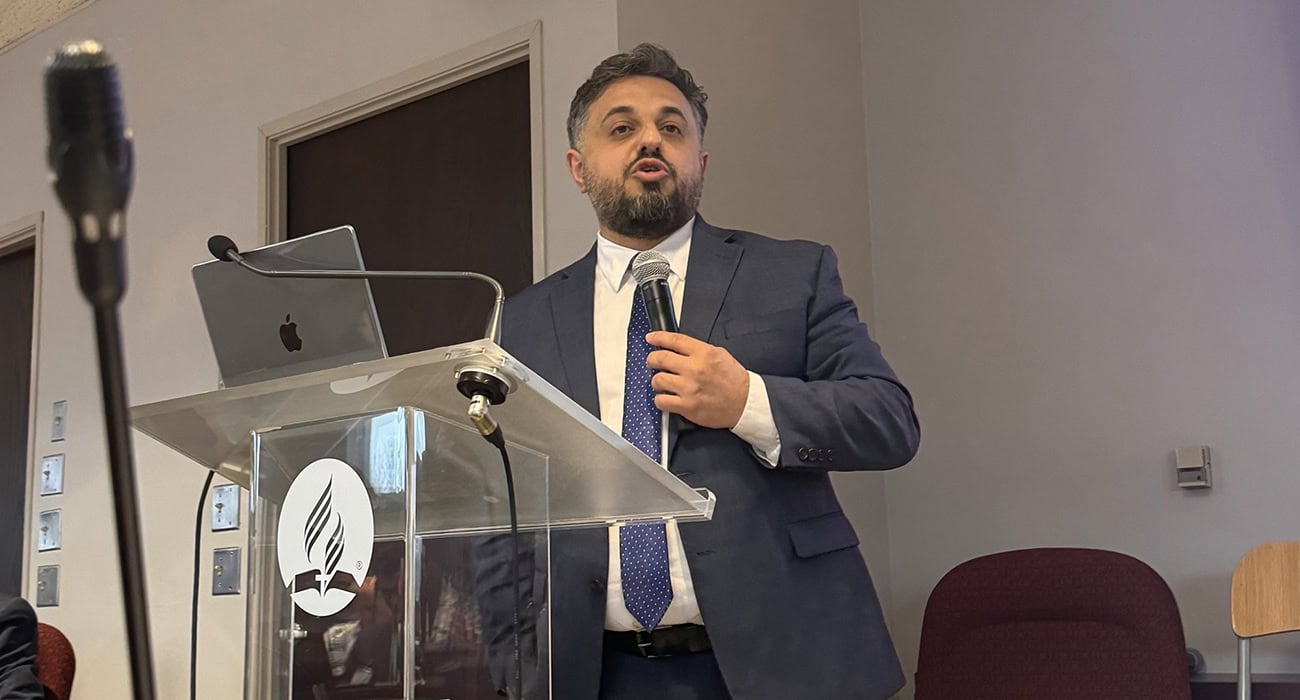
Seventh-day Adventist leaders have taken steps to better integrate the world church’s 13 divisions and attached fields with six Global Mission centers, which help the church better understand how to start new groups of believers among non-Christian people groups.
The Global Mission Issues Committee meeting, held April 2-3, concluded with three recommendations: for Global Mission centers to help divisions train local leaders to reach high-priority people groups; for divisions to invite Global Mission centers to be part of the process of selecting and training missionaries for their territories; and for divisions to invite Global Mission center leaders to their year-end meetings.
Global Mission Centers director Kleyton Feitosa also announced the establishment of Global Mission center advisories that will meet online twice a year.
“This is really going to enhance the work,” Feitosa said on the second day of the meeting at the world church headquarters in Silver Spring, Maryland.
The advisories, which will include about 40 advisors, will allow for input and counsel from current leaders and people familiar with each center’s focus people group.
Feitosa also announced new names for several of the centers to better reflect their purpose. The six Global Mission centers include the Global Mission Center for Adventist-Buddhist Relations, the Global Mission Center for Adventist-Jewish Relations, the Global Mission Center for Adventist-Muslim Relations, the Global Mission Center for South Asian Religions, the Global Mission Center for Secular and Post-Christian Mission, and the Global Mission Center for Urban Mission.
Mission Refocus
The non-Christian people groups that the Global Mission centers are helping to reach comprise 63 percent of the world’s population, or five billion people. Those groups are at the heart of a world church initiative called Mission Refocus, which prioritizes resources for frontline mission work with people in the 10/40 Window, city dwellers, and secular and post-Christian people.
At the Global Mission Issues Committee meeting, General Conference secretary Erton Köhler unveiled plans to nearly double the number of frontline foreign missionaries to 627 from the current 332 over the next five years. In addition, another 4,000 volunteers will join the ranks for those who serve in foreign countries.
“We are together warning this world and preparing everybody in the four corners of this world for the second coming of Jesus,” Köhler said.
He emphasized that the three angels’ messages in Revelation 14:6-12 begin with a call to go into all the world, preaching the everlasting gospel “to every nation, tribe, tongue, and people” (NKJV), and noted that church co-founder Ellen G. White also underscored the importance of reaching every people group. Reading a statement that she made in the General Conference Daily Bulletin on February 20, 1893, he said, “ ‘There is home missionary work that is to be done, and we hear the plea, so long as there is so much sin and such need of labor in our own country, why manifest such zeal for foreign countries? I answer, our field is the world.’ ”
Adventist Mission director Gary Krause recalled that Adventists initially thought they could proclaim the gospel to the world by reaching the various people groups who had immigrated to the United States. But, encouraged by Ellen White, they decided to send the church’s first missionary to a non-Christian country in the 1890s. The missionary, a single woman named Georgia Burrus, arrived in India in 1895. In another milestone, more than 50 missionaries were sent to China in 1916, he said. The church’s current emphasis on reaching non-Christian people groups has its roots in a global strategy approved at Annual Council in 1986.
“We rejoice that a new Adventist church is being organized today every three and a half hours,” Krause said. “However, the challenge remains. … It’s time for a Mission Refocus on how we as Global Mission centers are working with the divisions, working together in an integrated way to reach the 10/40 Window, to reach the post-Christian window, and to reach the urban window.”
General Conference president Ted N. C. Wilson praised what he called a revitalization of the six Global Mission centers and asked all church division presidents “to be very intentional in involving themselves with the centers.” The first center was opened in 1989.
Wilson also urged church leaders to benefit from the experience of their predecessors.
“I encourage you to build on what has been created,” he said. “Mission Refocus is not just another nice term. It is, by God’s grace, to help us finish the work.”
The original version of this story was posted by Adventist Mission.